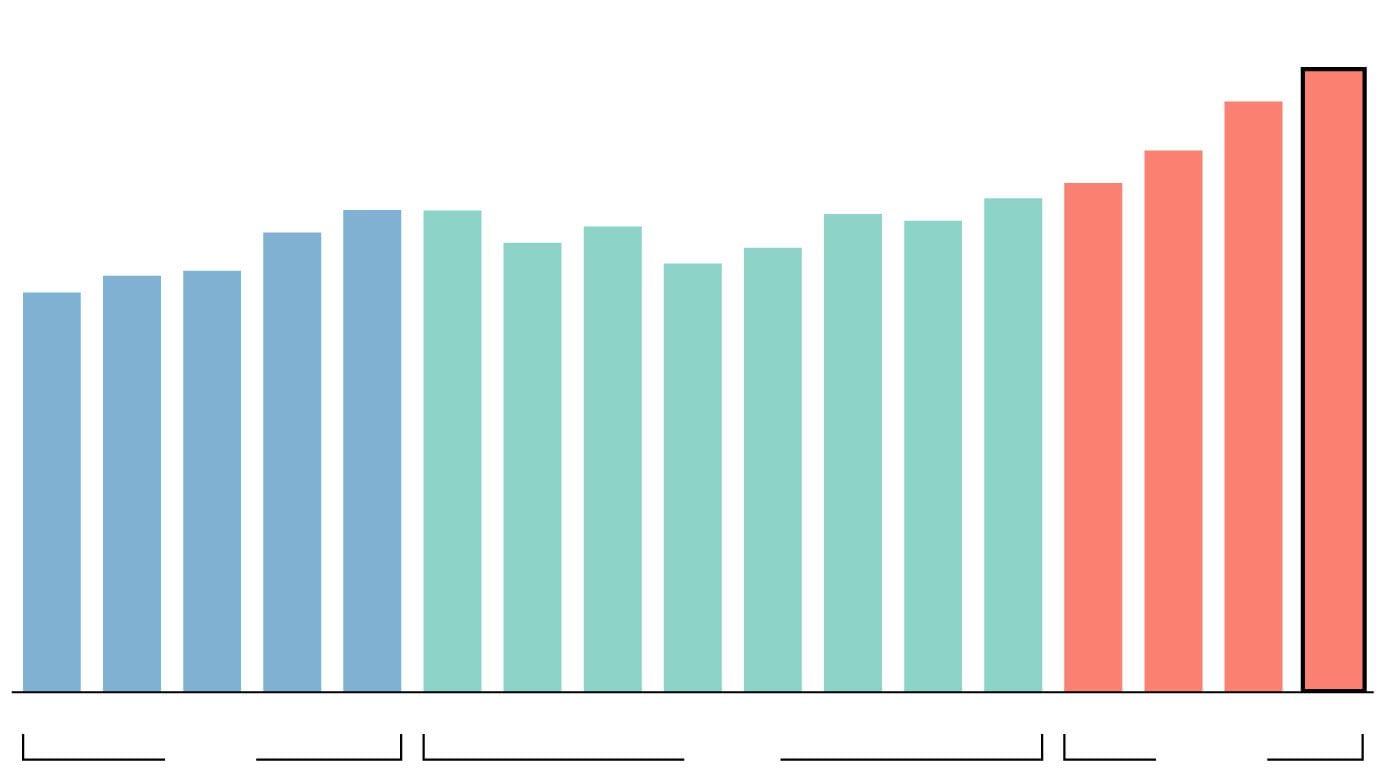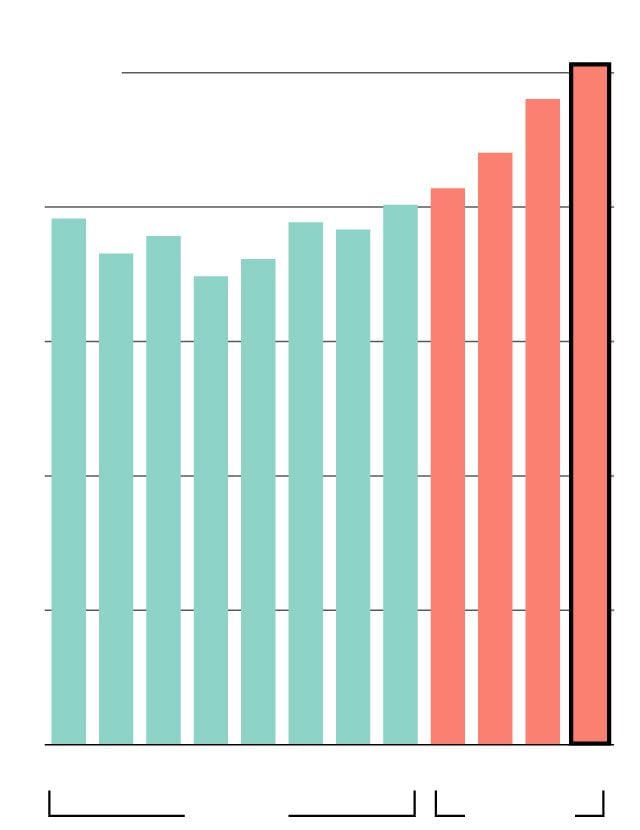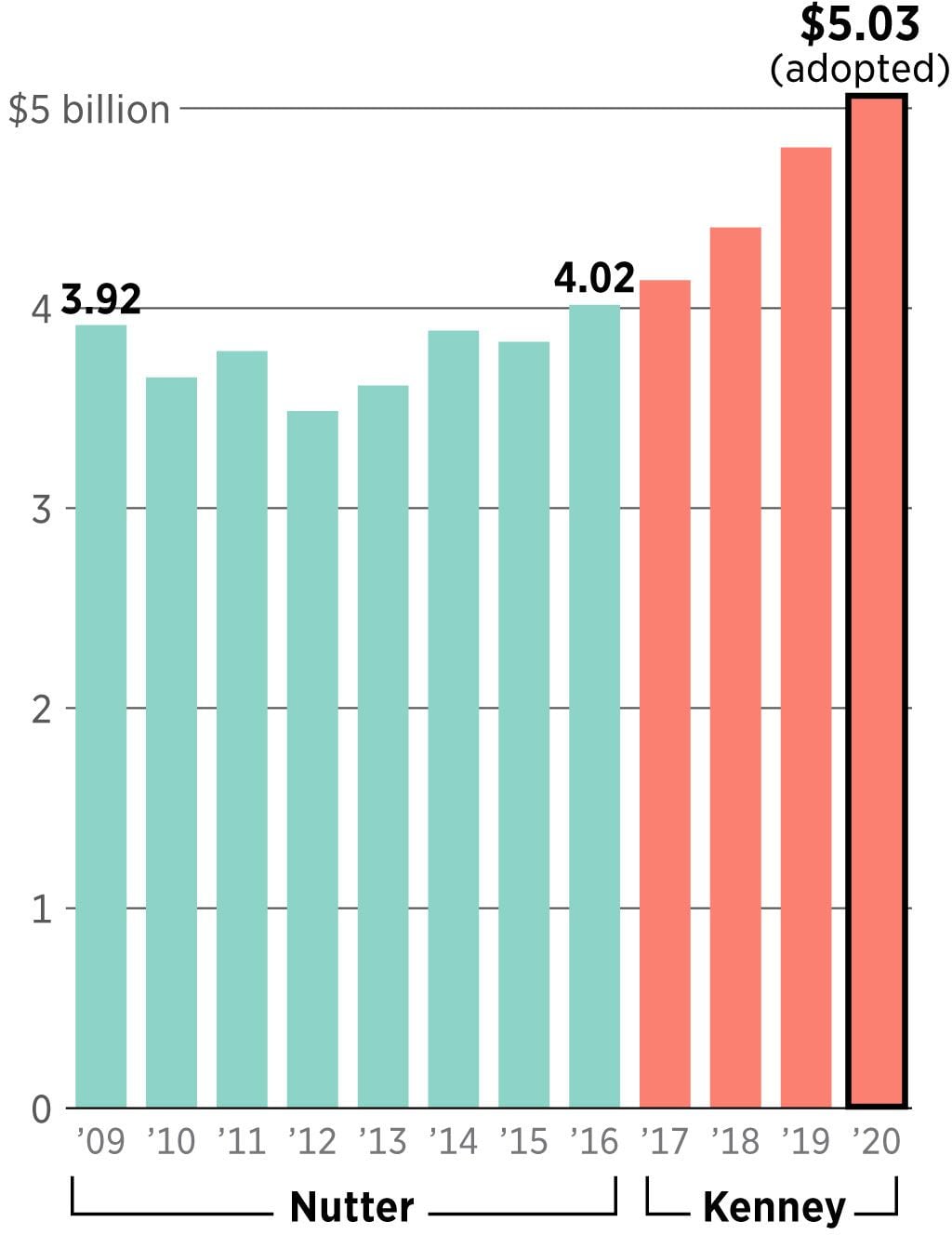City Council passes $5 billion budget for 2019-20. Spending has grown $1 billion in 4 years.
City Council approved a $5 billion spending plan for fiscal year 2020, a $1 billion increase from when Kenney took office.

Philadelphia City Council on Thursday approved a $5 billion spending plan for fiscal year 2020, an increase of $300 million from the current budget that officials said was necessary to cover spiking salary and benefits costs, as well as bolster antipoverty initiatives.
The hike means that the city’s general fund budget has grown by $1 billion, or 25 percent, since Mayor Jim Kenney took office in 2016.
The Kenney administration and several Council members defend the growth in spending, saying many of the increases are simply restorations of cuts made during the recession. Fixed costs such as pensions and health care have also gone up, together by nearly $200 million. Payroll has increased by more than $250 million, in part due to raises negotiated with labor unions. And Kenney has increased the city’s contribution to the School District by $122 million.
Philadelphia’s Fiscal 2020 Budget
The $5.025 billion budget passed by Council Thursday represents a 25 percent increase in spending from Mayor Michael Nutter’s last budget.

$5.03
(adopted)
Amounts are in billions.
4.80
4.40
4.14
4.02
3.92
3.92
3.89
3.83
3.79
3.74
3.65
3.61
3.48
3.43
3.39
$3.25
’04
’05
’06
’07
’08
’09
’10
’11
’12
’13
’14
’15
’16
’17
’18
’19
’20
Street
Nutter
Kenney

$5.03
(adopted)
$5 billion
4.02
3.92
4
3
2
1
0
’09
’10
’11
’12
’13
’14
’15
’16
’17
’18
’19
’20
Nutter
Kenney

Council President Darrell L. Clarke, who in the first budget hearing in March was critical of the four-year surge in spending, said last week that it is needed to address poverty, echoing Finance Director Rob Dubow’s initial response to him.
“We are still No. 1 in big cities as it relates to the poverty rate. The simple reality is that we need to move the needle,” Clarke said. “So some of the things we talked about and actually put in the budget will address entry-level opportunities.”
Clarke cited the LandCare Reentry Program, which provides jobs and training to people returning to the workforce after prison. That program received a $1.9 million boost for fiscal year 2020, which starts July 1.
Councilman Allan Domb, a real estate mogul and Council’s fiscal hawk, said he doesn’t see any notable return — in areas like crime or poverty — on the increase in spending over the last four years.
“We need to better address quality-of-life issues,” Domb said. “To increase taxes on top of that really upsets the public, and they have a reason to be upset.”
Neither the administration nor Council proposed tax-rate increases this year, but property reassessments resulted in automatic property tax hikes for many.
Most departments saw their funding rise in the last four years. Some of the most significant bumps were to the Police Department, which has seen a $90 million increase since the 2017 budget, and the Fire Department, which got $76 million more in funding over the last four years.
Just before Council members voted, Republican Councilman David Oh introduced an amendment to cut the spending plan by $160.55 million, slashing fringe benefits and indemnities. It failed; the 2020 budget passed by 16-1.
Council increases to 2020 budget
Council members added $30 million worth of line-item spending requests to the $4.995 billion budget Kenney proposed in March.
In addition to the LandCare Reentry Program, run by the Planning and Development Department in a partnership with the Pennsylvania Horticultural Society, here are some of the other allocations negotiated between Council and the Kenney administration:
A $2.5 million increase to the Commerce Department’s budget ($9.9 million total) for commercial corridors and neighborhood economic development partnerships.
$4 million for a partnership with Philadelphia Industrial Development Corp. to expand entrepreneurial resources for women, minorities and immigrants (for a total of $7.7 million “economic stimulus.”)
A $1.6 million increase to the Streets Department budget (totaling $157 million) to fund emergency fixes to deteriorating retaining walls that threaten private properties, as well as money for LED streetlights and street cleaning.
A $1 million increase to the Office of Homeless Services (total budget: $59.9 million) for the city’s two domestic-violence shelters and family homelessness prevention.
A $1.7 million increase to the Finance Department (total budget: $100.3 million), of which $500,000 will go toward repaving small and historic streets. The department will also distribute about $1.2 million to community organizations, a list that in previous years has included the Mann Center, City Year, Avenue of the Arts, Clef Club, African American Museum, Black Writers Association, and Phlash.
Councilwoman Maria QuiñonesSánchez said the spending increases are in part an effort to restore cuts made during the recession in 2009.
“This budget helps us get back to ... providing some basic services in the neighborhood,” she said. “People want better services, and we all thought poor funding is not adequate.”
The city’s budget was $3.9 billion in 2008, the year the housing bubble burst. Adjusted for inflation, that’s the equivalent of $4.65 billion in 2019. The budget approved Thursday is $375 million more than that.
Budget highlights
The fiscal year 2020 budget is part of the Kenney administration’s five-year plan, which includes some larger initiatives:
$36 million for the Philadelphia Resilience Project, the citywide emergency response program focused on combating the opioid crisis.
$30 million to support the “Philadelphia Roadmap to Safer Communities,” an antiviolence initiative.
$30 million for the Police and Fire Departments to add 50 officers, 1,500 body cameras, seven fire companies, and facility and equipment upgrades.
The first-ever contribution to the city’s Rainy-Day Fund, a deposit of $34.3 million to start a savings account in case of an economic downturn.
In a statement, Kenney thanked Council for the approval of a budget he said “represents the priorities of the residents of Philadelphia.”
“This budget shows that my administration and City Council are addressing the biggest challenges facing Philadelphia,” he said.
Council also voted Thursday to increase the property-tax homestead exemption to $45,000, which would shave $70 off the typical homeowner’s tax bill.